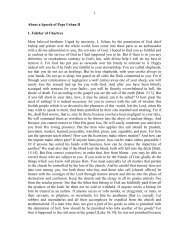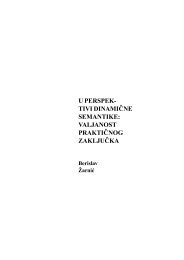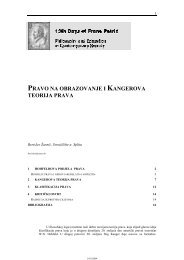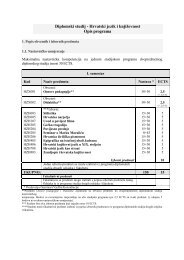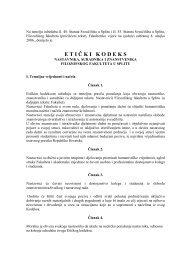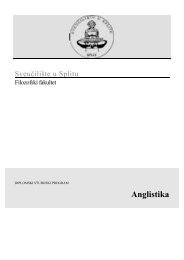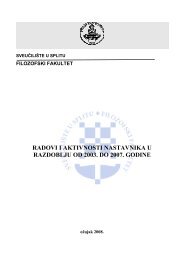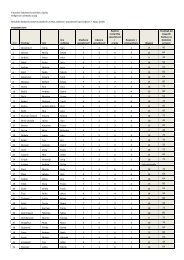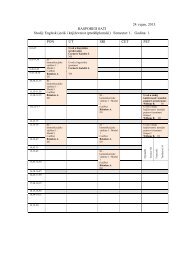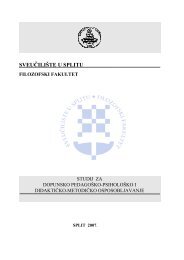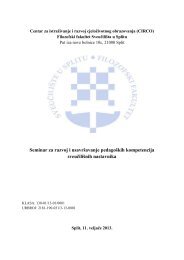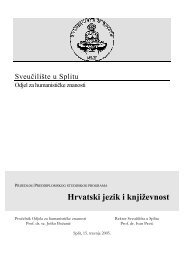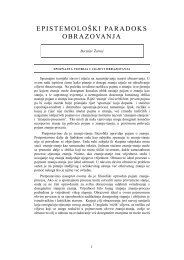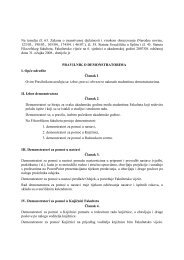English Studies
English Studies
English Studies
Create successful ePaper yourself
Turn your PDF publications into a flip-book with our unique Google optimized e-Paper software.
G R A D U A T E D E G R E E P R O G R A M M E : E N G L I S H S T U D I E S<br />
Teaching<br />
methods<br />
Assessment<br />
methods<br />
Language of<br />
instruction<br />
Quality<br />
assurance<br />
methods<br />
1. Short introductory lectures (traditional) on the history and theory of<br />
literary translation with active student participation in the ensuing<br />
discussion about the topic;<br />
2. Introductory practical guidelines for independent translation work on a<br />
shorter literary text (progression from simpler to more complex texts; from<br />
one genre to another);<br />
3. Seminars: individual and group analysis and assessment of translation<br />
assignments (independent work) with active student participation;<br />
4. Workshops: translation of the assigned literary text in pairs or smaller<br />
groups with teacher assistance and ensuing group discussion;<br />
5. Tutorials: teacher counselling given to individual students for finding<br />
solutions to problems arising from the assigned or freely chosen translation<br />
texts (students’ choice);<br />
6. Independent work: a) assigned texts for translation; b) freely chosen texts<br />
for translation (students’ choice).<br />
Active student participation is encouraged in all areas of work and study.<br />
The assessment of student knowledge and performance will be based on the<br />
following:<br />
1. Continuous assessment (independent homework translation tasks,<br />
seminar papers and workshop achievements; portfolio).<br />
2. Exam: written, i.e. presentation of the final seminar translation text.<br />
Croatian and <strong>English</strong>.<br />
1. Student feedback via questionnaires and surveys.<br />
2. Lecturers responsible for the same subject area collaborate closely and<br />
monitor each other’s work.<br />
Course title Literary translation – Module 2<br />
Course code HZE901<br />
Type of course Seminar / Advisory hours<br />
Core course (Optional course in 3.1.1.)<br />
Level of course Specialised level course<br />
Year of study Second Semester Four<br />
ECTS<br />
(Number of<br />
credits allocated)<br />
2 ECTS credits<br />
Contact hours (20 seminars + 5 advisory hours) = 0.62 credits.<br />
Student study time (41.25 hours) = 1.38 credits.<br />
Name of lecturer Mia Pervan, MA, Senior Lecturer, Professional Translator<br />
Learning<br />
outcomes and<br />
competences<br />
After successful completion of this module, the student is expected to have<br />
the:<br />
- ability to demonstrate knowledge and understanding of the concepts,<br />
principles and theories related to the subject of literary translation;<br />
- ability to deal with specific problems of translating texts from earlier<br />
periods;<br />
- ability to start work as a literary translator.<br />
- ability to apply the acquired knowledge and skills to the translation of<br />
54



